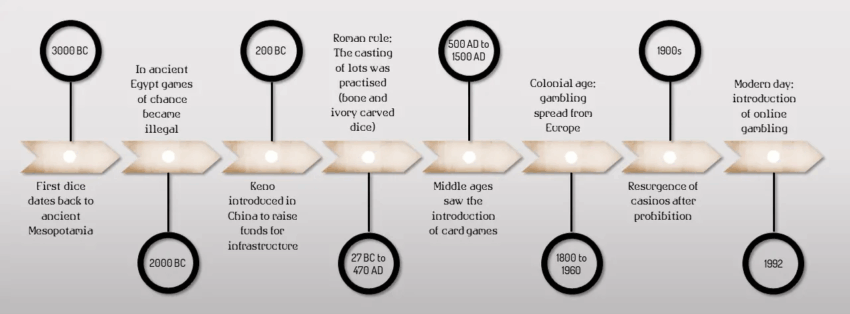The evolution of gambling is a fascinating journey that has captivated humanity for centuries, evolving from ancient rituals to a multifaceted global industry. As we delve into the evolution of gambling, it’s essential to consider how this practice has transformed not only in terms of legality but also through technological advancements and cultural acceptance. The historical roots of gambling are deeply embedded in various societies, showcasing a rich tapestry of betting from early dice games to modern online platforms. Today, the legalization of gambling in many regions has further revolutionized the landscape, allowing for new opportunities and revenue generation. Additionally, with the rise of online gambling trends and innovative gambling technology, the economic impact of this industry continues to expand, making it a significant player in today’s entertainment economy.
Exploring the development of wagering activities reveals how these pastimes have shifted dramatically through time. From ancient betting customs to the rise of sports wagering and online gaming, the transformation of gambling reflects broader societal changes. The current landscape is characterized by a growing acceptance of chance-based games as mainstream entertainment, with an emphasis on legal frameworks that support responsible play. In particular, the digitization of gambling has led to new trends and practices that redefine user experience and engagement. As we examine these shifts—often referred to as gaming evolution—it’s crucial to recognize the interplay between technology, culture, and economic implications in shaping the future of this vibrant industry.
Understanding the Evolution of Gambling Through History
The evolution of gambling is a captivating reflection of our society’s broader changes over the centuries. From the ancient practice of dice games in Mesopotamia to the elaborate betting houses of 18th-century Europe, gambling has served as a mirror to cultural attitudes towards risk, chance, and entertainment. The history of gambling can be explored through its various forms, which not only provided amusement but also played roles in political strategies, rituals, and social gatherings. In ancient Rome, for example, betting on gladiatorial contests was commonplace, blending civic pride with the thrill of uncertainty, merging entertainment with cultural identity.
As we navigate through the timeline of gambling, we observe significant shifts tied to societal values and economic structures. The proliferation of legal gambling has roots in the need for state revenues, showcasing how the legalization of gambling in different forms reflects economic priorities. During the Depression, for example, states turned to gambling as a means to rejuvenate their economies. Today, as more jurisdictions accept and regulate gambling, this evolution highlights an ongoing dialogue about its impacts on society, economics, and legality, ultimately shaping modern perceptions of gambling as a legitimate form of recreation.
Frequently Asked Questions
How has the legalization of gambling influenced its evolution over the years?
The legalization of gambling, particularly in the United States, has significantly influenced the evolution of gambling practices. The repeal of the Professional and Amateur Sports Protection Act (PASPA) in 2018 marked a crucial turning point, leading to the legalization of sports betting in over 30 states. This shift reflects changing societal attitudes, with gambling increasingly accepted as a legitimate form of entertainment and a source of tax revenue, driving further evolution in both state regulations and market offerings.
What role does technology play in the evolution of gambling and online gambling trends?
Technology plays a pivotal role in the evolution of gambling, particularly with the rise of online gambling trends. The advent of the internet has enabled the proliferation of online casinos and sports betting platforms, allowing players to access a diverse array of games from anywhere. Mobile technology has further accelerated this trend, with more than 50% of online gambling now taking place on smartphones. Innovations like virtual reality and blockchain are expected to transform user experiences and enhance transaction transparency, shaping the future landscape of gambling.
| Key Point | Details |
|---|---|
| Historical Roots of Gambling | Gambling dates back to 3000 BC with ancient civilizations like China and Rome participating in various betting practices. |
| Recent Legalization Trends | The repeal of PASPA in 2018 led to sports betting legalization in over 30 states and DC, reflecting changing perceptions. |
| Technological Impact on Gambling | The internet and mobile technology have transformed gambling, with over 50% occurring via smartphones and platforms like DraftKings leading the market. |
| Regulation and Player Safety | Increased regulation focuses on player safety through age verification and responsible gaming initiatives to protect players. |
| Cultural Shifts Towards Gambling | Gambling is now seen as mainstream entertainment, especially during events like the Super Bowl, contrasting its past perceptions as a vice. |
| The Economic Impact of Gambling | The U.S. gambling industry generates over $50 billion annually, contributing to job creation, tourism, and government tax revenue. |
| Future Trends in the Gambling Industry | Emerging technologies like VR and blockchain, along with gamification, are expected to enhance engagement and reshape the industry. |
Summary
The evolution of gambling is a fascinating journey that reveals how this practice has morphed through time, shaped by advancements in technology, changing regulations, and evolving social attitudes. From its origins thousands of years ago with dice in ancient civilizations to the modern, highly regulated online betting environments of today, the evolution of gambling highlights the adaptability of this industry. Today, gambling is no longer viewed merely as a taboo activity but has risen to prominence as a vital component of the entertainment sector, particularly during major sporting events. As we look toward the future, the integration of cutting-edge technologies and continued discussions about the balance of economic benefits and social responsibility will undoubtedly guide the next chapters in the ongoing evolution of gambling.
